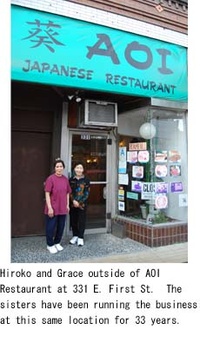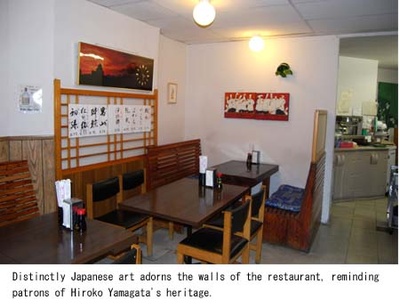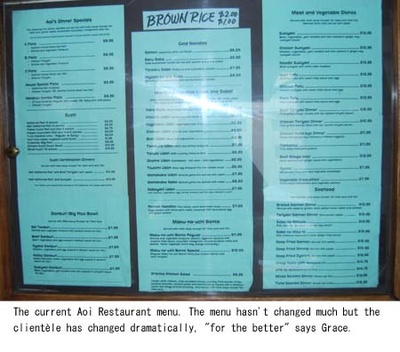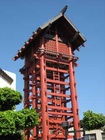Mrs. Hiroko Yamagata and the Aoi Restaurant have a remarkable story. The Aoi Restaurant is located on historic First Street in Little Tokyo, Los Angeles. Founded in 1976 by Mrs. Hiroko Yamagata, Aoi Restaurant has braved the highs and lows and remained in the same location for 33 years. Now a Little Tokyo mainstay, the restaurant has always offered delicious home-style cooking and a comforting atmosphere. As a Japanese immigrant in the 1960s, Mrs. Yamagata showed incredible perseverance and bravery starting and maintaining her own successful and celebrated business.
Grace Maruyama, Mrs. Hiroko Yamagata’s older sister, immigrated to America in 1962 and, after a while, obtained citizenship (also adopting the American name of ‘Grace’). In 1968, Mrs. Hiroko Yamagata traveled from Hiroshima to join her sister and work as a dressmaker downtown until her next-door neighbor offered her a life changing opportunity. He knew that Mrs. Yamagata had two young children to put through college and that it would be very hard to manage on a dressmaker’s salary. Her neighbor owned a building on First Street and informed her that a space would be available soon. Knowing absolutely nothing about running a restaurant, Mrs. Yamagata valiantly opened up the Aoi Restaurant.
Luckily, her sister had been working on 2nd Street at Toki Restaurant and had garnered valuable restaurant experience. Toki was in the process of moving locations giving Grace Maruyama time to help out her sister. The two sisters got the business up and running and soon had a loyal customer base of local Japanese residents. Word spread quickly of Aoi’s amazing tempura and teriyaki dishes and friendly staff. Through courageousness and determination, Mrs. Yamagata has maintained a successful business for 33 years. As a long time respected Little Tokyo restaurant owner, Mrs. Yamagata enjoys a certain celebrity status. When new restaurants open, owners ask her to come and taste their food in hopes of receiving her approval.
Getting Mrs. Hiroko Yamagata’s approval is a respectful means of acknowledging her enduring presence in Little Tokyo. However, she laments the current lack of community in Little Tokyo. When Mrs. Yamagata first opened up Aoi Restaurant in the Seventies she remembers a friendly, close-knit community of restaurant owners. She recalls “You could count the number of restaurants in Little Tokyo on your hands”. All the owners were Japanese, shared a common history and were concerned with the welfare of the other owners. Now, with over 20 different restaurants with both Japanese and non-Japanese owners, the dynamic is not the same as it once was. Additionally, many of the original owners passed their businesses down to their children who have different concerns than their parents.
Another change that Hiroko Yamagata has encountered is the dramatically different customer base in Little Tokyo. In the 1970s, the clientele was comprised entirely of Japanese people. Her patrons were mostly Japanese that lived in the area and visiting personnel for Japanese companies. Mrs. Yamagata remembers, “When I first opened, most White Americans didn’t eat raw fish (sashimi)” or know much about Japanese food. However, after the Japanese economic bubble crashed in the 1980s, many local Japanese residents returned to Japan. Local Angelenos soon filled the void and Americans slowly began catching on to Japanese food. Now, the popularity of Little Tokyo and the vibrant nightlife draws a diverse crowd with a hunger for delicious Japanese food. Mrs. Hiroko Yamagata likes the new group of people because they give Little Tokyo a distinct and fun nature.
Despite being an immigrant woman, Mrs. Hiroko Yamagata had no reservations about opening the business in the 1970s. Still one of the only female business owners in Little Tokyo she is proud to own such a successful restaurant. A member of the Little Tokyo Business Association, Anti-Crime Unit, and Japanese Restaurant Association, Mrs. Yamagata notes the lack of female presence in such associations. But, she is also quick to mention that all the members are friendly and work towards the same goal.
Mrs. Yamagata remembers the 1984 Olympics as a time of great excitement for Los Angeles and especially Little Tokyo. Before Japanese towns in Torrance and Gardena were built, Little Tokyo was the only place Japanese visitors could go to eat Japanese food. As a result, when the Olympics came to Los Angeles, Little Tokyo was inundated with Japanese tourists. Mrs. Yamagata recalls the occasion as “nigiyaka” which translates to bustling, or busy. Japan ranked seventh place that year receiving 10 gold medals, 8 silver medals and 18 bronze medals. All the excitement of the people in Little Tokyo at that time produced an exhilarating atmosphere in the restaurant that Mrs. Yamagata remembers quite fondly.
Miraculously, in her 33 years of running the Aoi Restaurant, Mrs. Yamagata cannot remember any particular moments of hardship. She good-naturedly recalls that the people who worked with her for a long time, “Worked very hard.” Laughingly, she remembered numerous college students she became friends with who went abroad to Japan and when they came back were surprised to see her still working. There were hard times but Mrs. Yamagata fearlessly continued on and now proudly states that “the good moments far outnumbered the bad ones!”
With the ability to come to a foreign country, start a business with no prior knowledge or experience and become a celebrated mainstay of Little Tokyo, Mrs. Yamagata is certainly an exceptional individual. The restaurant has provided her with numerous wonderful memories and relationships. Bubbly and genuinely kind, Mrs. Hiroko Yamagata and her sister Grace Maruyama provide a wonderful example for the people of Little Tokyo.
* Discover Nikkei partnered with Professor Morgan Pitelka of Occidental College and his students taking the Spring 2009 seminar "Japanophilia: Orientalism, Nationalism, Transnationalism" on a meaningful community-based documentation project. The students interviewed owners of five long-time Little Tokyo businesses to create Nikkei Album collections and articles.
View the Nikkei Album collection: Aoi Restaurant
© 2009 Robert Bonaparte






